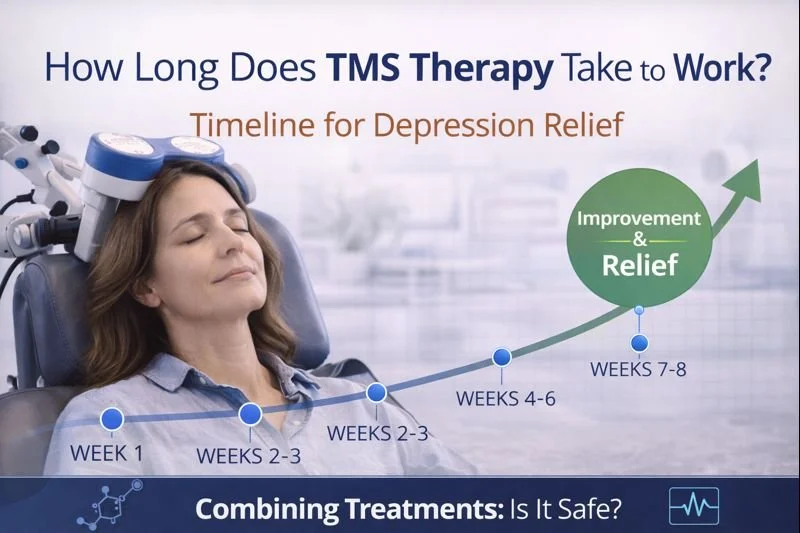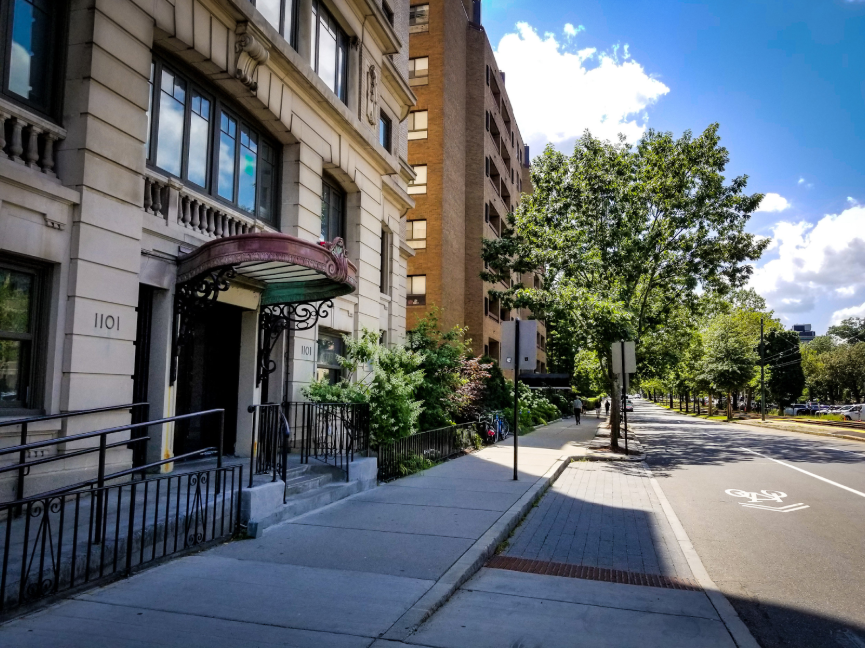How Long Does TMS Therapy Take to Work? Timeline for Depression Relief
Understanding TMS Therapy for Depression
Wondering how long it takes for TMS therapy to work? Most patients start noticing improvement within 2-4 weeks, with full benefits appearing around weeks 4-6. However, results vary based on individual brain chemistry, depression severity, and treatment consistency.
At Dignity Brain Health in Brookline, MA, we specialize in personalized TMS therapy for depression, serving patients from Boston, Cambridge, Newton, and surrounding areas.
Read on for a week-by-week breakdown of what to expect from TMS treatment.
👉 Learn more about how TMS therapy works at Dignity Brain Health.
How Long Does It Take for TMS Therapy to Work?
TMS Therapy Timeline: When Will You Feel Better?
📅 When Will You See Results from TMS Therapy?
Patients undergoing traditional Transcranial Magnetic Stimulation (TMS) therapy for depression typically begin to notice changes in their mood and overall symptoms after approximately two weeks of consistent sessions. However, the timeline for improvement can vary based on multiple factors, including the individual's neurological response, the severity of their depression, and any concurrent treatments such as medication or psychotherapy. Some patients may experience earlier relief, while others may require additional time before significant improvements become evident.
Clinical studies suggest that the majority of individuals receiving standard TMS therapy (one session per day, five days per week) report substantial symptom reduction by the fourth to sixth week of treatment (Carpenter et al., 2012). This gradual onset is believed to be due to neuroplastic changes induced by repetitive magnetic stimulation, which helps regulate brain activity in areas associated with mood and emotional processing, particularly the dorsolateral prefrontal cortex (DLPFC).
📌 Can TMS Work Faster? Accelerated TMS Protocols Explained
Many patients wonder, "Is there a faster way to get results from TMS?" The answer: Yes!
🚀 Accelerated TMS protocols deliver multiple TMS sessions per day over 5-10 days instead of the traditional 6-8 weeks (Cole et al., 2020)
🔹 Breakthrough Research on Faster TMS:
Stanford Accelerated Intelligent Neuromodulation Therapy (SAINT): Patients report relief within days using multiple iTBS sessions daily.
Studies show accelerated TMS can be just as effective as traditional TMS—but much faster.
💡 Who Should Consider Accelerated TMS?
Patients with severe, treatment-resistant depression needing rapid relief.
Those unable to commit to 6-8 weeks of daily sessions.
Patients seeking an alternative to medication-based treatments.
Extended Treatment Courses and Long-Term Benefits
While many patients experience noticeable symptom relief after the initial 10–15 sessions, some individuals may require extended treatment courses to achieve full remission. Research indicates that continued treatment beyond the initial response period leads to steadier and more sustained improvements in mood and overall mental health. For this reason, completing the full recommended course—typically spanning six to eight weeks—is crucial for achieving optimal and long-lasting benefits.
Furthermore, some patients who respond well to TMS may benefit from maintenance sessions even after completing their initial treatment course (Wilson et al., 2022). These follow-up sessions, which can be scheduled weekly, biweekly, or monthly, help sustain symptom relief and prevent relapse, particularly for individuals with recurrent depressive episodes.
Here's a general timeline on the standard improvement from TMS therapy:
Week 1-2: Initial Phase
Symptom Relief: Some patients may begin to notice subtle improvements in mood and energy levels.
Side Effects: Mild side effects such as scalp discomfort or headaches can occur but often diminish as treatment progresses.
Week 2-4: Noticeable Improvement
Symptom Reduction: A significant number of patients experience notable reductions in depressive symptoms during this period.
Functionality: Improvements in daily functioning and emotional stability are commonly reported.
Week 4-6: Continued Progress
Symptom Alleviation: Many patients continue to experience a decrease in depressive symptoms, with some achieving remission.
Sustained Benefits: The therapeutic effects of TMS are often sustained, contributing to long-term mood improvement.
Week 6-8: Maintenance Phase
Ongoing Treatment: For some patients, additional sessions may be necessary to maintain the benefits achieved.
Booster Sessions: Periodic booster sessions might be recommended to sustain symptom relief over time.
📌 How Long Until You Feel Better with TMS? Final Takeaways
✔ Most patients notice improvements in mood between 2-4 weeks.
✔ Full benefits typically emerge between 4-6 weeks.
✔ Accelerated TMS may offer faster relief in just days.
✔ Every patient’s response varies based on brain chemistry & depression severity.
Factors That Influence Your Results
Each patient’s experience with TMS therapy is unique. The speed and effectiveness of treatment depend on:
Severity of depression: More severe cases may take longer to respond.
Consistency: Attending all scheduled sessions enhances results.
Lifestyle habits: Regular exercise, healthy nutrition, and therapy complement TMS benefits.
Individual brain chemistry: Every brain responds differently to treatment.
Still have questions? Check out our FAQ page on TMS therapy.
***
🌟 Looking for TMS Therapy Near You? Where to Get TMS Therapy for Depression in Boston
📍 Conveniently located near:
✅ Boston, Cambridge, Newton, Alston, Somerville, & Back Bay
Dignity Brain Health - TMS Therapy Clinic
💡 Why Choose Dignity Brain Health for TMS?
✔️ Expert Boston TMS Specialists – Harvard Medical School-trained; Treating depression with TMS since 2017.
✔️ Personalized Treatment Plans – Tailored to your unique mental health needs.
✔️ Insurance-Friendly Process – We handle the paperwork for you.
✔️ Proven Results – TMS can improve symptoms for patients who haven’t responded to medication.
📅 Take the First Step Toward Relief
👉 📆 Find Out If TMS Is Right for You; Book Your TMS Consultation Now (Insurance-Covered)
💬 Still have questions? Contact us today and speak with a specialist about whether TMS therapy is right for you!
🌍 Mental Health Resources in Boston for Depression & TMS Therapy
If you or a loved one are struggling with depression, these trusted resources in Boston offer professional support:
🔹 Massachusetts General Hospital Psychiatry Department – Offers psychiatric evaluations, therapy, and medication management for depression and anxiety.
🔹 Boston University Center for Psychiatric Rehabilitation – Specializes in mental health recovery programs, vocational rehabilitation, and outpatient services.
🔹 Samaritans Boston (Suicide Prevention) – A free 24/7 crisis helpline offering confidential emotional support.
Dignity Brain Health is committed to helping patients find the best mental health care in the greater Boston area.
References:
Wilson, S., Croarkin, P. E., Aaronson, S. T., Carpenter, L. L., Cochran, M., Stultz, D. J., & Kozel, F. A. (2022). Systematic review of preservation TMS that includes continuation, maintenance, relapse-prevention, and rescue TMS. Journal of Affective Disorders, 296, 79-88.
Cole, E. J., Stimpson, K. H., Bentzley, B. S., Gulser, M., Cherian, K., Tischler, C., et al. (2020). "Stanford Accelerated Intelligent Neuromodulation Therapy for Treatment-Resistant Depression." Brain Stimulation, 13(5), 1273–1282. https://doi.org/10.1016/j.brs.2020.07.013
Blumberger, D. M., Vila-Rodriguez, F., Thorpe, K. E., Daskalakis, Z. J., & Downar, J. (2018). "Effectiveness of Theta Burst Versus High-Frequency Repetitive Transcranial Magnetic Stimulation in Patients With Depression (THREE-D): A Randomized Noninferiority Trial." The Lancet, 391(10131), 1683-1692. https://doi.org/10.1016/S0140-6736(18)30295-2
Carpenter, L. L., Janicak, P. G., Aaronson, S. T., Boyadjis, T., Brock, D. G., Cook, I. A., ... & Demitrack, M. A. (2012). Transcranial magnetic stimulation (TMS) for major depression: a multisite, naturalistic, observational study of acute treatment outcomes in clinical practice. Depression and anxiety, 29(7), 587-596.
—
CONTACT INFO:
DIGNITY BRAIN HEALTH
1101 BEACON STREET, SUITE 8W
BROOKLINE, MA, 02446
UNITED STATES
Phone: (617) 855-7288


